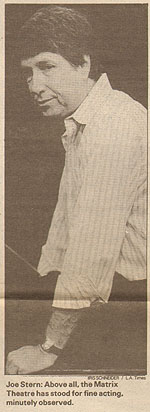 It's too bad that Joe Stern refuses to read Simon Gray's book about
his experiences trying out "The Common Pursuit" at the Matrix Theater
(see Barbara Isenberg's adjoining article). If he ever softens, he'll
discover that Gray found him a lovable man and a patient producer.
It's too bad that Joe Stern refuses to read Simon Gray's book about
his experiences trying out "The Common Pursuit" at the Matrix Theater
(see Barbara Isenberg's adjoining article). If he ever softens, he'll
discover that Gray found him a lovable man and a patient producer.
Patient???? I only hear from Stern when he's upset about something—a
dumb review, some crazy new stunt from Actors' Equity. He's not too patient then. But under the surface noise you
hear a serious concern for the theater. Not just his theater, but
everybody's.
Gray criticizes Stern for spending too much tryout time on actors who
obviously weren't going to be cast in this play, or perhaps any play.
That's because Stern understands the agony actors go through at
auditions, having been one himself.
What does he call his organization? "Actors for Themselves." The
record hasn't been that altruistic, but the title shows Stern's
priorities. The guy just loves actors. Even better, he believes in them.
That's rare these days. Everybody gives lip service to the idea that
the actor is as central to the theater as the priest is to the Mass.
But in an industry town—a town where 300 people will show up for the
lowliest Equity Waiver tryout—it's easy to take actors for granted. It's
easy to start to look at the town's talent pool in the patronizing way
of a New England textile mill owner regarding his town's labor
pool—endlessly available, instantly replaceable. What's really admired,
in this philosophy, is a strong foreman—i.e., director.
That has never been the philosophy at the Matrix. Stern does hire
strong directors, as with his current twin bill, "Wenceslas Square"
(staged by Lee Shallat) and "A Man With Connections" (Kristoffer Siegel-Tabori).
Sam Weisman and Norman Rene are other names that come to mind.
But the director at Stern's shop is there to help the actors locate
their performances, not to turn them into agents of his concept. Gray
pokes fun at the Method-y stuff that went on at Weisman's "Common
Pursuit" rehearsals, the emphasis on breaking down the script into beats
and "finding the pain" of each character, and maybe the jargon does look
a little silly.
But the reader recognizes a director who can talk the actor's
language and who respects his need to know what is going on underneath
the lines. The process may not be as invigorating as when the actors
simply stand the play up and have a bash at it, London fashion. But it's
the way that plays get rehearsed over here, in the better houses, and
the results at the Matrix weren't half bad, even in Gray's eyes.
The Matrix is definitely one of our better houses. Stern's priorities
sometimes lead him to take on a script that "acts" like crazy but
doesn't add up to a hill of beans, "Orphans" being the best example.
But in general one goes to the Matrix confident that the script will
be intelligent; that the company will be well chosen and well rehearsed
(Stern doesn't just love actors, he knows actors); that the
production will be handsomely designed and precisely lit, and that the
amenities will be observed.
The program for "The Common Pursuit," for example, was printed on
good paper in a chaste red-and-black typeface. The reference was to the
literary quarterly that figured in Gray's plot. It was a touch of class
that most local small-theater producers would have rejected as too
expensive, if it had occurred to them at all.
Above all, the Matrix has stood for fine acting, minutely observed.
Crisp acting, too. They may go for "the pain" in rehearsal at the
Matrix, but the performances are very much on the line. Stern likes
actors who have a top story and a bottom story, who don't see a
contradiction between feelings and intelligence.
The results can be very rich, as with Nancy Lenehan's current
performance in "Wenceslas Square." Lenehan plays three women, each with
a different answer to the question: How is it possible to live an
acceptable life in a country (Czechoslovakia) that has had its tongue
cut out?
The first woman's answer is to be cautious. The second woman's answer
is to be gruff and scornful. The third woman's answer is to be gay.
Lenehan understands each answer and also understands that no human being
is all of a piece. The timid one can laugh with delight. The flirtatious
one can be thoughtful. All in all, Lenehan is really playing about nine
people here, as simply as if she were playing one.
Beautiful stuff. But we've had dozens of fine performances at the
Matrix. There was Helen Verbit in "Table Settings," a Jewish mother who
wasn't going to let anybody treat her like a stereotype,
especially not her family. There was Ian McShane in "Inadmissible
Evidence,"; a burned-out case careening to disaster, the only thing
that would save his hide.
There were McShane, Lawrence Pressman and Penny Fuller in Pinter's
"Betrayal." They betrayed nothing, and said it all. There was also
Michael Alaimo in the tiny role of a waiter in an Italian restaurant.
Without taking the focus away from the main story, he had a story of his
own, relating to pride of service—the pleasure that a person can take in
providing world-class service, even when his patrons don't notice it.
Joe Stern runs on the same juice.